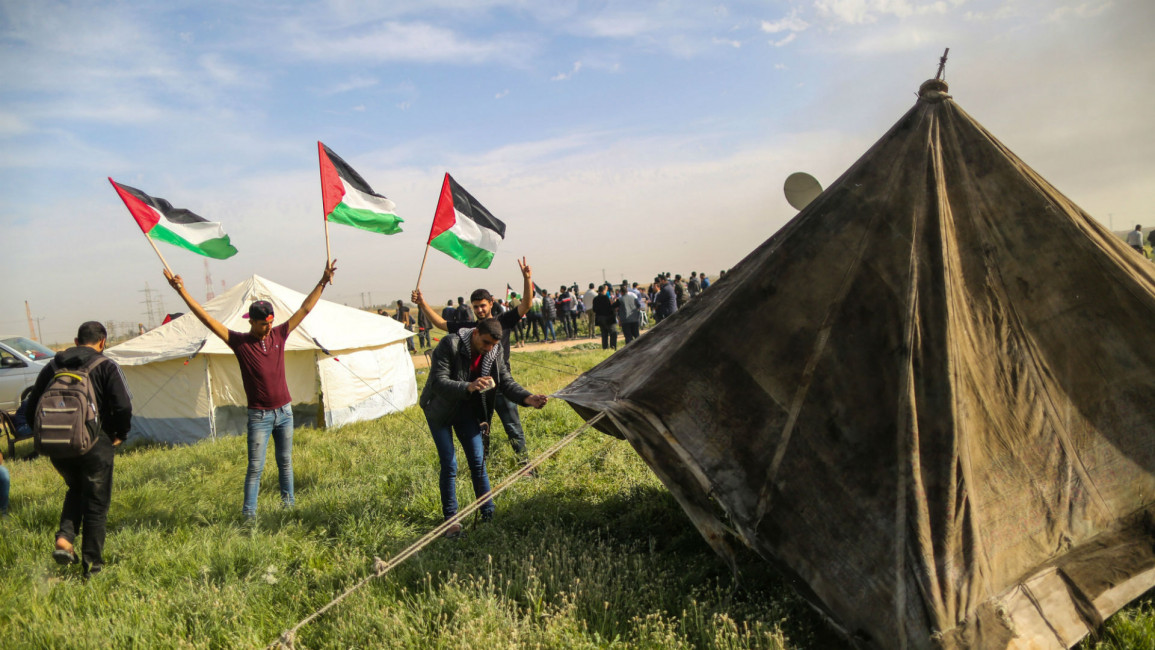Palestinians prepare mass 'right of return' rallies along Gaza border
Hamas is hoping to mobilise large demonstrations along the border with Israel in the coming weeks, culminating with a march to the border fence on 15 May to commemorate the mass expulsion of Palestinians during Israel's establishment in 1948.
Beginning on Friday, the group is imploring Palestinians to set up tents near the border with the hopes of mobilising hundreds of thousands.
"When we march to the border, the organizers will decide then what to do," said Ismail Radwan, a Hamas official.
Warning Israel against targeting the protesters, he said "the occupation should not commit any stupidity in confronting the Palestinian crowds."
Hamas says the demonstrations will culminate in a mass march on 15 May to draw attention to the plight of hundreds of thousands of Gazans whose relatives fled or were expelled from their homes in what is now Israel during the 1948 war.
More than 60 percent of Palestinians in Gaza are refugees from towns and villages in what is now Israel.
The demonstrations will begin after the Muslim noon prayer on Friday. Buses will carry people from all over Gaza to the five tent camps, situated hundreds of meters from the border fence.
Twitter Post
|
Hamas and Hamas-allied organizers of the "Great Return March" say the sit-in will remain peaceful through May. But the ultimate plan is to move to the border in mid-May.
Organizers say they are trying to realize the "right of return," a Palestinian demand that descendants of refugees who lost their homes in 1948 should be able to return to lost family properties in what is now Israel.
Hamas under pressure
The mass protests come at a low point for Gaza rulers Hamas. An Egyptian-led attempt to broker a reconciliation deal with the rival Fatah movement took a major downturn earlier this month after a bomb targeted the convoy of Palestinian Authority Prime Minister Rami Hamdallah.
PA President Mahmoud Abbas has blamed Hamas and threatened more financial pressure, such as cutting civil servant salaries or fuel purchases, to force the group to cede control.
An Israeli-Egyptian blockade, three wars with Israel and a series of Palestinian Authority sanctions have left Gaza's economy in tatters, with unemployment well over 40 percent and electricity only available for a few hours a day.
"Hamas has realized it's besieged from three sides; Israel, Egypt and the Palestinian Authority," said Mkhaimar Abusada, political science professor at Gaza's al-Azhar University. "It feels the crisis is suffocating."
He said that for Hamas, the protests can divert attention from their domestic woes while avoiding renewed war with Israel. "They think busying Israel with this issue may put it under pressure," he said.
The announcement by Hamas comes as Palestinians prepare for annual Land Day protests on 30 March to commemorate the killing of six unarmed Palestinian demonstrators in Israel in 1976.
This year's demonstrations - due to take place in Gaza and the occupied West Bank - appear especially combustible as anger is already high in Palestine over US President Donald Trump's decision in December to recognise Jerusalem as Israel's capital.



